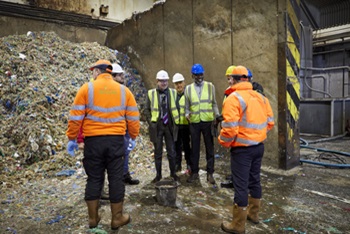Local food waste set to power homes
The new contract will see the 7,000 tonnes of food waste produced by Lewisham residents every year - which is equivalent to over 550 double-decker buses - be used to power homes and produce fertiliser for the agricultural sector. It will also save the Council £200,000 per year, which will put back into local communities – helping to fund the delivery of services for residents.
Taking Cllr Codd and Council staff through the digestion process, officers at East London Biogas explained how the food waste that arrives at the plant is separated from the bin lining and pumped into an anaerobic digestion tank where it produces a biogas that is converted into energy. The digested waste also produces a digestate fertiliser which can be used on local farms to help grow crops.
Garden waste will be recycled into compost as part of the new contract, which comes into effect in April.

The new arrangements form part of the Council's recently adopted Waste Strategy for 2021-2031, which focuses on reusing resources and keeping materials in use for longer.
As part of the Council's new approach to waste management, plans are now being developed to expand food waste collections to local housing estates, businesses and markets - and later in the year, to schools.
Cllr Patrick Codd, Cabinet Member for Environment and Transport, said: Transforming the way we manage waste is a vital part of our fight against climate change and promote the circular economy of waste. Food waste makes up over 40% of our recycling collections, and so we have an opportunity to make a real difference to our environment by changing how we deal with it. We're pleased to be working with East London Biogas to ensure our food waste is put to good use - helping to power homes and other buildings as part of our new approach to waste management
Jack Armond, Commercial Manager, East London Biogas, said: We're delighted to be working with Lewisham Council to help address the climate crisis though innovative solutions to the issue of organic waste being sent to landfill. Landfill can be avoided by utilising treatment facilities such as anaerobic digestion, which recycles food waste back into local community use in the form of renewable energy and digestate fertiliser for local farmlands. Tackling climate change can't be done alone - by teaming up with Lewisham Council and other boroughs, we can all work together to keep resources in use for longer, limit the impact that waste has on our environment and create a greener future for local people.